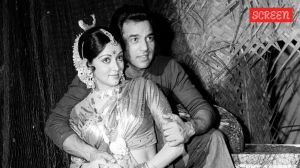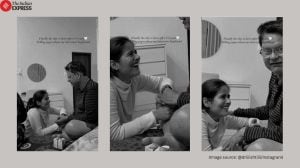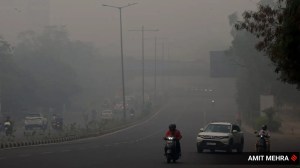The World With Its Mouth Open is a remarkable meditation on survival and connection in a fractious world
Zahid Rafiq chooses his words with care and plays around with structure, language, memory and identity in ways that mirror the disjointed and interrupted nature of life in Kashmir
 This is a collection that thrives in the tension between the personal and the collective, and Rafiq’s careful balance makes it a remarkable debut. (Source: Amazon)
This is a collection that thrives in the tension between the personal and the collective, and Rafiq’s careful balance makes it a remarkable debut. (Source: Amazon)In Unfortunately, It Was Paradise, Palestinian poet Mahmoud Darwish asks, “Where can I free myself of the homeland in my body?” Zahid Rafiq’s The World With Its Mouth Open, a debut collection of 11 short stories set in another troubled paradise, knows the futility of such an attempt. Instead, it embraces the homeland tighter, capturing the grief and unease of a world on the verge of breaking apart. In that embrace, there is resilience and grace, dry humour and something that feels redemptively like hope.
Through intimate, often fragile moments of daily life — a pregnant woman caught between the past and the present, between absence and presence; a young man back from his job at an American university chasing after what could easily be dismissed as a nightmare; a pack of strays trying to find food and shelter in an inhospitable land; a shopkeeper struck by the sadness that shadows the face of a new mannequin — the narrative flits between darkness and light, casual cruelty and empathy, sanctuary and dystopia. It is a world where scarring and healing coexists and where the leitmotif of violence cannot quell the longing of its people for an ordinary, unremarkable life of their own choosing. In refusing to reduce the experience of the region to mere tragedy, Rafiq lends it an honesty and emotional complexity. He steers it away from clichéd portrayals, presenting Kashmir as a land where a brittle humanity thrives in all its fragility.
Unlike many other works that home in on the unrest that dogs Kashmir, Rafiq’s stories offer a more intimate, introspective lens. Like Mirza Waheed’s The Book of Gold Leaves (2014), there is a lyrical sensibility to the latter’s narrative. Rafiq chooses his words with care and plays around with structure and language, meditating on memory and identity in ways that mirror the disjointed and interrupted nature of life in Kashmir. In one of the finest stories in the collection, ‘Crow’, a young imaginative boy hopes that he would be spared his teacher’s wrath for not having prepared for an examination yet again. “He thought of handing in his paper and submitting to whatever lay ahead… But what if something happened in this minute?… the soldiers could barge in again in their big boots, turning everything upside down, poking even into their school bags with the long guns.” It is a thought so extraordinary, so incongruous for a little boy that it gives the reader pause — in that moment, between two kinds of dehumanisation, the child would gladly opt for the disruption of the former to avoid the abasement of the latter. Afterwards, his thin sore frame smarting from the beating, and the teacher’s ominous words hanging in the air — “‘Do you know what is waiting out there?’ he said… The world, the teacher yelled. ‘With its mouth open…” — he finds distance and resistance in the very thing that had let him down: his imagination.
And yet, the world with its mouth open accosts Kashmiris at every juncture. It is a world where the State hovers in the backdrop at all times, where soldiers hemmed in in sandbag bunkers stand with their guns at the ready, viewing the people through the lens of their rifles; where every household has aged before its time. It is these “stories behind the stories, stories so sad, so funny, so true, that there was no place for them in the papers, stories that in their telling and retelling became myths and belonged to no one and to everyone” that a young journalist shares with colleagues outside the newsroom in ‘In Small Boxes’ that the history of its people is put together one frame at a time.
Rafiq’s writing is neither overtly ideological nor polemical; instead, with a journalist’s eye for detail, he invites the reader into the quiet spaces where grief and hope jostle side by side. His prose reflects the quiet, often unnoticed, consequences of prolonged conflict — the erosion of memory, the disintegration of relationships, and the relentless search for connection in a fractious land. This is a collection that thrives in the tension between the personal and the collective, and Rafiq’s careful balance makes it a remarkable debut.
- 01
- 02
- 03
- 04
- 05































